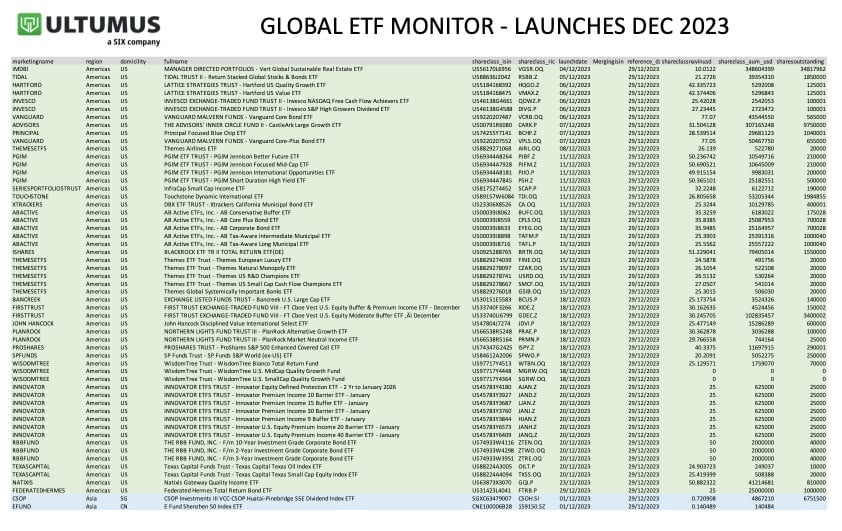Quick summary:
- Vanguard lists two ESG ETFs in the US that track FTSE indexes and put up fairly standard exclusion screens
- Cambria lists absolute return ETF of ETFs, with an opaque index methodology
- Texan charity Impact Shares lists the most hardcore ESG fund we’ve yet seen
- More bond ETFs come to Taipei
USA
Vanguard, the last holdout, bows to ESG
ESG ETFs attract attention like nothing else in ETF land. The media loves them and they get a lot of press. ETF providers love them too and they get lots of listings and special marketing material.
But amid the crazed rush into ESG ETFs one famous player has been a notable holdout: Vanguard. But now, the dominant elephant in the passive jungle is now making its move, and Vanguard is listing two ESG ETFs that use negative screens to weed out corporate baddies from a FTSE Russell Indexes.
- Vanguard ESG U.S. Stock ETF (ESGV)
- Vanguard ESG International Stock ETF (VSGX)
ESGV will take the universe of US stocks, in a manner similar to the legendary VTI, then screen out those in tobacco, alcohol, porn, gambling, nuclear power and weapons. Companies will also be removed if they “do not meet the labor, human rights, environmental, and anti-corruption standards as defined by the UN global compact principles,” the prospectus says. There will also be measures in place to rule out companies with too few women and racial minorities.
VSGC does something similar but for companies outside the US and is a spin on Vanguards famous VT.
Analysis – ESG is just a reaction to Trump’s election
The ESG craze is a political – not financial – phenomenon. And its timing is explainable by Trump’s electoral victory in 2016.
This may sound like a bold statement, but it shows up very clearly in the data. Money flowing into ESG ETFs was flat from 2008 to 2015, the years Obama was in office. So too were the number of new ESG ETFs listed on global exchanges. Yet in 2016, the year of Trump’s election, all the numbers liftoff. More money than ever before started gushing into ESG funds while more ESG products hit the exchanges, particularly in the US.
In our view, investors should go into ESG ETFs for political reasons not economic ones. In their best-selling book, Triumph of the Optimists, professors Elroy Dimson and Paul Marsh found that tobacco companies were the best performing companies worldwide over the past 120 years. Studies by independent quants (as distinct from those in the pay of index providers) have found ESG funds tend to underperform and create value buys for other investors. If investors wish to put their money where their values are, that is their right. But be mindful that they may underperform.
Impact Shares lists a poor countries and poor children ETF
Impact Shares, a Texas-based ESG ETF provider and registered charity, is listing a new ESG product that puts a seriously sharp row of teeth in its ESG screen. The Impact Shares Sustainable Development Goals Global Equity ETF (SDG) will track companies that are committed to helping poor people in poor countries and have signed UN pledges to that effect. All the profits the ETF makes will go to charity. SDG will track the Morningstar Societal Development Index. To qualify in this index companies must show:
(i) commitment to the UN’s Sustainable Development Goals,
(ii) adherence to the principles of the UN Global Compact,
(iii) commitment to reducing poverty and supporting economic development globally and
(iv) exposure to countries with low levels of socioeconomic development
Reading through the prospectus on how these criteria are assessed is a thing of beauty (the business ethics criteria spans three pages…). As part of its assessment, Morningstar looks at 32 separate social indicators that have been important to the UN Capital Development Fund. We won't list out all of them (those interested in the whole list, click here) but they include bribery and corruption programmes, renewable energy programs, HIV/AIDS programs, collective bargaining agreements for unions, programmes for women, use of fair trade goods, avoiding making unfair loans, not exploiting your suppliers -- and many, many more.
The fund takes the top 200 companies based on their ethics score and market weights them.
Cambria lists absolute return multi asset ETF of ETFs
Meb Faber-backed Cambria is listing a multi-asset ETF of ETFs that looks, walks and smells like an absolute return fund. The Cambria Trinity ETF (TRTY) will track a house index that is “designed to model absolute positive returns with reduced volatility and manageable risk,” the prospectus says. It will do this by investing in the full gamut of equity and bonds, REITs, commodities and currencies.
How the index selects its assets is kept quite opaque. The prospectus says that it will select funds with diversified exposure to many asset classes (through ETPs and other instruments). Securities will be selected based on a model portfolio based on exposures to factors such as value, momentum, and trend investing. At rebalance the index will hold 20% in equity; 20% in bonds; 50% in “trend following strategies; 10% to other asset classes such as real assets.
Beyond these narrow gleanings the prospectus doesn’t give away much.
Taiwan
KGI lists long-term bond ETFs
Taipei-based KGI Securities is listings two new long-term bond ETFs that should help bring the institutional bond market closer to Taiwanese retail investors.
- KGI China Policy Bank 3-10 Year Bond ETF (00748B)
- KGI 10+Year Emerging Market USD Investment Grade Bond ETF (00749B)
As far as we can tell, both funds do what they say on the tin. The latter offering guns after EM bonds that are US dollar denominated via the Bloomberg Barclays EM USD Sovereign + Quasi-Sov Baa 10+ Year 15% Country Cap Index. The former fund will track Chinese government debts via the Bloomberg Barclays China Policy Bank 3-10 Years Index.




